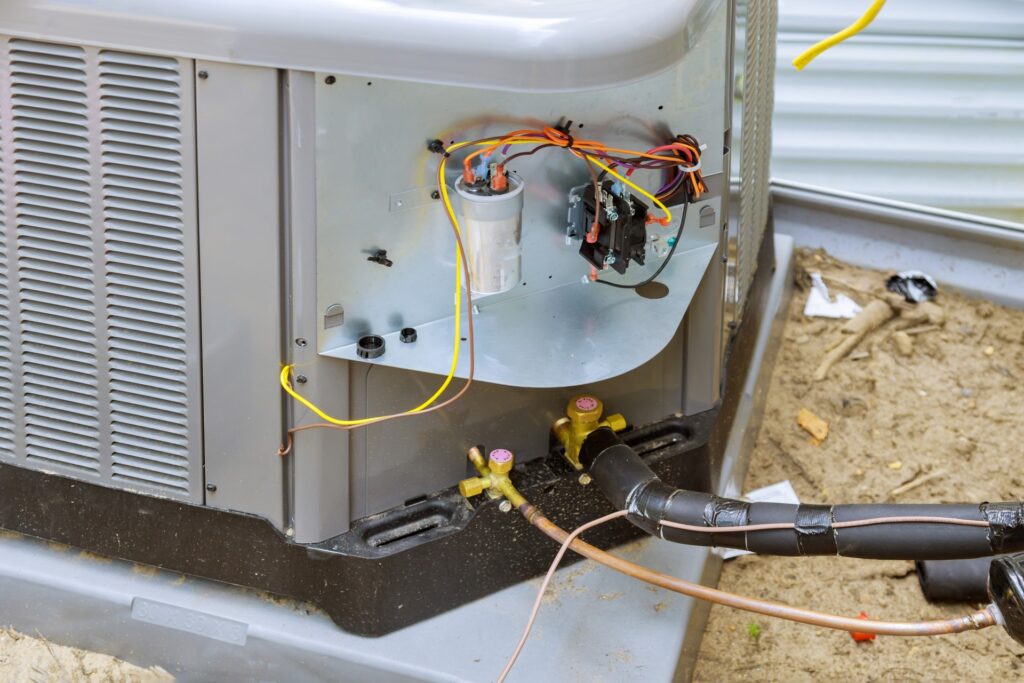The Cost of Ignoring AC Repairs: How Small Issues Turn Into Big Expenses
Call Us Anytime!
Don’t Sweat It, Let Us Help
Your air conditioning system is one of the most crucial appliances in your home, especially during the peak of summer. It keeps your living space comfortable, ensures good air quality, and helps regulate humidity. However, like any mechanical system, your AC requires regular maintenance and occasional repairs. Many homeowners tend to delay minor repairs, thinking they can save money in the short term. Unfortunately, ignoring small AC problems often leads to much bigger, costlier issues down the road.
In this blog, we’ll break down how neglecting AC repairs can lead to higher energy bills, decreased efficiency, expensive breakdowns, and even complete system failure. By the end, you’ll see why addressing small issues early is the best strategy to save money and ensure your AC operates efficiently for years to come.




Higher Energy Bills: The Immediate Consequence of Ignoring Repairs
When an AC system isn’t running efficiently due to minor issues, it has to work harder to cool your home. This inefficiency results in increased energy consumption, leading to noticeably higher utility bills.
Common AC Problems That Cause Increased Energy Usage:
- Dirty or Clogged Filters – A clogged air filter restricts airflow, forcing the system to work overtime to maintain the desired temperature. This can increase your energy consumption by up to 15%, according to the U.S. Department of Energy.
- Refrigerant Leaks – If your AC is low on refrigerant due to a leak, it won’t cool effectively, causing the compressor to run longer and use more energy.
- Failing Capacitors – The capacitor helps start the AC motor. If it’s weak or failing, your system may struggle to turn on or maintain consistent cooling, leading to excessive energy use.
- Dirty Condenser Coils – When the outdoor unit’s condenser coils are covered in dirt and debris, heat transfer is compromised. The system has to work harder to dissipate heat, leading to longer cooling cycles and higher electricity bills.
How Much Can Ignoring Repairs Cost You in Energy Bills?
If you neglect small AC issues, your system could consume anywhere from 10% to 40% more electricity than it should. Over a summer season, this could mean hundreds of dollars in wasted energy costs.
Increased Wear and Tear on AC Components
Every time your AC has to overcompensate for a minor issue, it puts additional strain on its components. The longer this goes on, the more likely you are to experience part failures that require costly repairs.
Common Small Issues That Lead to Major Wear and Tear:
- Low Refrigerant Levels – If your AC is running with inadequate refrigerant, it places excessive strain on the compressor, the most expensive component to replace.
- Clogged Air Ducts – Poor airflow forces the system to cycle longer, wearing out the blower motor.
- Short Cycling – When an AC turns on and off frequently, it wears out electrical components such as relays, switches, and capacitors.
The Risk of Major Breakdowns and Emergency Repairs
Ignoring AC repairs can lead to unexpected system failures, often at the worst possible time—like during a heatwave when your AC is working the hardest. Emergency AC repairs are often significantly more expensive than routine maintenance or scheduled repairs.
Common Reasons for Emergency AC Breakdowns:
- Overheated Compressor – A refrigerant leak, dirty coils, or airflow issues can cause the compressor to overheat and shut down unexpectedly.
- Electrical Malfunctions – Loose or damaged wiring can lead to shorts, tripped breakers, or even electrical fires.
- Frozen Evaporator Coils – When airflow is restricted, moisture can freeze on the coils, preventing the AC from cooling properly.
Emergency Repair Costs vs. Regular Maintenance Costs:
By scheduling repairs as soon as you notice a problem, you avoid costly emergency visits that can disrupt your comfort and your budget.
Decreased AC Lifespan: Why Neglecting Repairs Shortens the Life of Your System
Most central AC units last 12–15 years with proper care. However, ignoring necessary repairs can significantly reduce this lifespan, forcing you to replace the system much earlier than expected.
How Small Issues Reduce AC Lifespan:
- A dirty filter or blocked duct forces the AC to work harder, increasing wear on the blower motor and reducing efficiency.
- An improperly charged refrigerant system (due to leaks) causes the compressor to run longer and hotter, leading to premature failure.
- Electrical issues can lead to overheating components, causing irreversible damage.
The Cost of Early AC Replacement vs. Keeping Your System Running Longer:
Replacing your AC too soon is a major financial burden. Investing in timely AC repairs and maintenance can help extend your unit’s lifespan by 5–7 years or more.
Poor Indoor Air Quality and Health Risks
Your AC plays a crucial role in maintaining indoor air quality by filtering out dust, allergens, and pollutants. When your system isn’t working properly, air quality can suffer, leading to health issues for you and your family.
How AC Problems Affect Air Quality:
- Mold and Mildew Growth – If the evaporator coils or ducts are clogged with moisture, mold and mildew can develop, leading to respiratory problems.
- Dust and Allergen Circulation – A dirty filter or leaky ductwork allows dust, pollen, and allergens to circulate throughout your home.
- Carbon Monoxide Risks – If your system shares ductwork with a malfunctioning furnace, carbon monoxide buildup can become a serious health hazard.
Health Issues Caused by Poor AC Maintenance:
- Increased allergy symptoms
- Worsening asthma conditions
- Fatigue and headaches due to poor air circulation
- Respiratory infections from mold exposure
Maintaining a clean, properly functioning AC system ensures you and your family breathe healthier air.
The Impact of Neglecting AC Repairs on Home Comfort
Beyond financial and operational consequences, ignoring AC repairs can significantly impact your home’s overall comfort. A malfunctioning air conditioner struggles to maintain a consistent temperature, leaving you and your family dealing with hot spots, humidity issues, and inadequate airflow.
Common Comfort Issues Caused by Delayed Repairs:
- Uneven Cooling: If some rooms are much warmer than others, it could be due to a failing blower motor, clogged ducts, or a refrigerant leak. This imbalance makes certain areas of your home unbearable during peak summer temperatures.
- Excessive Humidity: A properly functioning AC helps regulate humidity levels. If your AC isn’t removing moisture efficiently, your home can feel damp, sticky, and uncomfortable. High humidity also creates an ideal environment for mold growth, leading to further issues.
- Weak Airflow: If your AC isn’t pushing enough cool air through the vents, it could be due to blocked filters, damaged ductwork, or a failing compressor. Weak airflow leads to longer cooling times and higher energy consumption.
Addressing these issues promptly ensures that your home remains consistently cool and comfortable, even during extreme summer heat.
How AC Neglect Can Lead to Safety Hazards
While AC problems are often associated with comfort and efficiency, some neglected repairs can actually pose safety hazards to your home and family. Certain electrical, refrigerant, and structural issues can escalate into serious risks if left unaddressed.
Potential Safety Risks of a Malfunctioning AC:
- Electrical Fires: Faulty wiring, loose connections, or overloaded capacitors can create sparks, increasing the risk of an electrical fire. If your AC frequently trips the circuit breaker or emits a burning smell, it needs immediate attention.
- Refrigerant Leaks: Low refrigerant levels can result from small leaks in the system. Not only does this affect cooling performance, but prolonged exposure to refrigerant chemicals can cause headaches, dizziness, and nausea.
- Carbon Monoxide Risks: If your AC system shares ductwork with a gas furnace, poor ventilation or blocked exhaust pathways can lead to carbon monoxide buildup. Although rare, this can have deadly consequences.
Being proactive about AC repairs doesn’t just save money—it protects your home and your family’s safety. If you suspect any of these issues, calling a professional HVAC technician is the best course of action.
How to Avoid Costly AC Repairs: Preventative Maintenance Tips
The best way to avoid these expenses is by being proactive with AC care. Here are some easy maintenance tips to keep your system running efficiently:
Schedule Regular AC Tune-Ups
- Have a professional inspect and clean your AC system at least once a year.
- Address minor issues before they become major problems.
Change or Clean Your Air Filters
- Replace disposable filters every 1–3 months.
- Clean reusable filters according to manufacturer guidelines.
Keep the Outdoor Unit Clear
- Remove debris, leaves, and dirt from around the outdoor unit.
- Ensure there’s at least two feet of clearance around the condenser.
Monitor Your Energy Bills
- If you notice an unexplained increase in energy costs, schedule an inspection immediately.
Listen for Strange Noises
- If your AC starts making odd noises, call a technician to prevent further damage.
Small Fixes Save Big Money
Ignoring AC repairs might seem like a minor inconvenience at first, but the hidden costs add up quickly. From skyrocketing energy bills and costly emergency repairs to a reduced system lifespan and poor air quality, the financial and health risks of neglecting AC issues are significant.
By taking a proactive approach to maintenance and addressing small issues before they escalate, you’ll save money, ensure comfort, and extend the life of your AC system. Don’t wait for a complete breakdown—schedule AC repairs at the first sign of trouble and keep your home cool and efficient all summer long.

